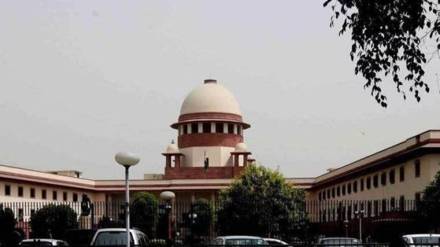Expanding the scope of Articles 14 and 21 of the Constitution, the Supreme Court has now included the “right against adverse effects of climate change” to be included within their ambit.
In a significant ruling, a three-judge bench of the Supreme Court led by Chief Justice of India DY Chandrachud noted that the Constitution recognises the importance of the natural world as it underlined Clause (g) of Article 51A that “stipulates that it shall be the duty of every citizen of India to protect and improve the natural environment including forests, lakes, rivers and wildlife, and to have compassion for living creatures”.
The bench noted that although these are not “justiciable provisions of the Constitution, they are indications that the Constitution recognises the importance of the natural world”.
“The importance of the environment, as indicated by these provisions, becomes a right in other parts of the Constitution. Article 21 recognises the right to life and personal liberty while Article 14 indicates that all persons shall have equality before law and the equal protection of laws. These Articles are important sources of the right to a clean environment and the right against the adverse effects of climate change,” it said.
The order by the three-judge bench, also comprising Justices JB Pardiwala and Manoj Misra, was passed on March 21 but the detailed order was only uploaded on Saturday evening.
The court noted in its order that despite governmental policy and rules and regulations recognising the adverse effects of climate change and seeking to combat it, there is no single or umbrella legislation in India which relates to climate change and the attendant concerns.
“However, this does not mean that the people of India do not have a right against the adverse effects of climate change,” it added.
The court further noted that the right to life is not fully realised without a clean environment which is stable and unimpacted by the vagaries of climate change. “The right to health (which is a part of the right to life under Article 21) is impacted due to factors such as air pollution, shifts in vector-borne diseases, rising temperatures, droughts, shortages in food supplies due to crop failure, storms and flooding. The inability of underserved communities to adapt to climate change or cope with its effects violates the right to life (Article 21) as well as the right to equality (Article 14),” it said.
The court was hearing a plea to protect the Great Indian Bustard (GIB) from losing its habitat due to power transmission lines. On April 19, 2021, a Supreme Court bench had ordered restrictions on the setting-up of overhead transmission lines in an area covering about 99,000 square kilometres and mooted the conversion of overhead low and high-voltage lines into underground power lines.
The Ministry of Environment, Forests, and Climate Change, Ministry of Power, and Ministry of New and Renewable Energy later approached the SC, seeking modification of its directions. Allowing the request, the bench pointed to the practical difficulties in implementing the order, including the technical and land acquisition challenges and prohibitive costs.
The court also set up a nine-member committee of experts to “assess the feasibility of undergrounding power lines in specific areas, considering factors such as terrain, population density and infrastructure requirements”. It also asked the committee to complete its task and submit a report to the court through the Union government on or before July 31, 2024.
